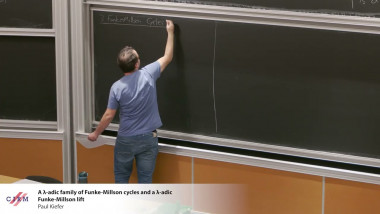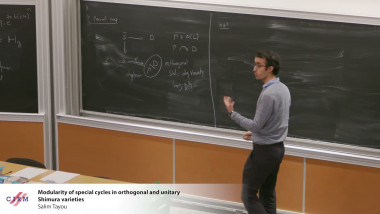
A $\lambda$-adic family of Funke-Millson cycles and a $\lambda$-adic Funke-Millson lift
By Paul Kiefer

Modularity of special cycles in orthogonal and unitary Shimura varieties
By Salim Tayou
Appears in collection : Prime numbers and arithmetic randomness / Nombres premiers et aléa arithmétique
Let $\lambda$ be the Liouville function, defined by $\lambda(n) = (-1)^{\Omega(n)}$ where $\Omega(n)$ is the number of prime factors of $n$ (with multiplicity). This completely multiplicative Let $\lambda$ be the Liouville function, defined by $\lambda(n)=(-1)^{\Omega(n)}$ where $\Omega(n)$ is the number of prime factors of $n$ (with multiplicity). This completely multiplicative function is believed to exhibit pseudo-random statistical properties. For example, its partial sums are conjectured to obey the square-root cancellation estimate $\sum_{n \leq x} \lambda(n)=O\left(x^{1 / 2+\varepsilon}\right)$; this is equivalent to the Riemann Hypothesis.
The Fourier uniformity conjecture (a close cousin of the Chowla and Sarnak conjectures) concerns the pseudo-random behaviour of the Liouville function in short intervals. In 2023, Walsh proved that, for $\exp \left((\log X)^{1 / 2+\varepsilon}\right) \leq H \leq X$,
$ \sum_{X \lt x \lt 2X} \sup _{\alpha \in \mathbb{R}}\left|\sum_{x\lt n \lt x+H} \lambda(n) e(n \alpha)\right|=o(H X) $
as $X \rightarrow \infty$. This non-correlation estimate is expected to hold for any $H=H(X)$ tending arbitrarily slowly to infinity with $X$ : this is the Fourier uniformity conjecture.
We improve on Walsh's range, proving that the Fourier uniformity conjecture holds for intervals of length $H \geq \exp \left((\log X)^{2 / 5+\varepsilon}\right)$.
